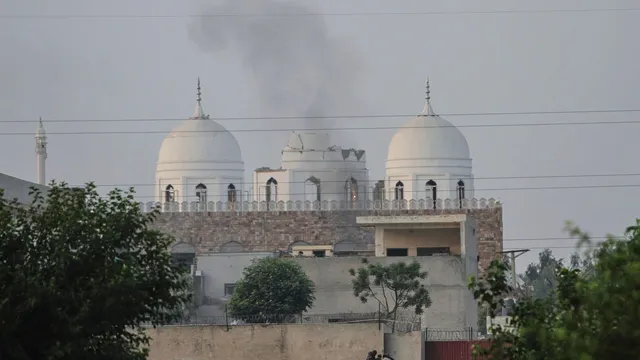
India strikes Pakistan, resulting in numerous casualties
2025-05-08 20:41- India launched missile strikes in Pakistan, particularly targeting a complex associated with a designated terrorist group.
- The attacks resulted in the deaths of at least 31 individuals and injuries to more than 50 others, raising tensions in a historically volatile region.
- In response, Pakistan condemned the strikes, asserting the need for defense and warning against future aggressions while underscoring calls for international support on peace.
Express your sentiment!
Insights
In the early hours of Wednesday, May 7, 2025, missile strikes carried out by the Indian military targeted a complex in Muridke, Pakistan, close to the border with India. This complex, which includes a mosque, hospital, and school, has been linked to groups that India accuses of terrorist activities. The strikes reportedly resulted in at least 31 deaths and injured dozens, escalating tensions between India and Pakistan amidst a backdrop of ongoing hostility over Kashmir. India's government claims these military actions aimed to dismantle 'terrorist infrastructure' following a terrorist attack in Pahalgam, which claimed the lives of numerous individuals, including several tourists, weeks prior. Pakistan's military condemned the strikes as an unprovoked act of war, asserting that it violates their sovereignty and vowed to retaliate against such acts. Both countries have exchanged accusations of ceasefire violations along the Line of Control, heightening fears of a military confrontation. Observers are closely monitoring the situation as world leaders have expressed concern about potential escalations in conflict that could lead to broader regional instability. Japan's leadership urged restraint, emphasizing the need for dialogue to avoid further deterioration of peace in the region. The international community remains on alert as the potential for a military response looms over both nations, both nuclear-armed states, with a precarious history of conflict over Kashmir. The deteriorating security situation holds implications for not just these two nations but for global stability as well, as ongoing violence could disrupt regional security dynamics and lead to wider international repercussions. The world watches closely for any indications of further military action from either side, as both nations prepare for any additional measures necessary to assert their national security interests.
Contexts
The history of the India-Pakistan conflict over Kashmir is complex and multifaceted, stemming from the partition of British India in 1947. As British rule concluded, India was divided into two separate nations: a predominantly Hindu India and a Muslim-majority Pakistan. The princely states, including Jammu and Kashmir, were given the option to join either nation or remain independent. The Maharaja of Kashmir, Hari Singh, initially opted for independence but faced an incursion from tribal militias supported by Pakistan. In response to this military threat, he sought assistance from India and agreed to accede to India in exchange for military support, thereby igniting the first Indo-Pakistani war in 1947-1948. This conflict resulted in a United Nations-mediated ceasefire, leading to the establishment of the Line of Control and a division of Kashmir between the two countries, with Pakistan controlling roughly one-third of the region, known as Azad Kashmir and Gilgit-Baltistan, and India retaining the remaining two-thirds, which includes the Kashmir Valley and Jammu region. The second major conflict over Kashmir erupted in 1965, when Pakistan launched Operation Gibraltar, aiming to infiltrate forces into Jammu and Kashmir to incite an insurgency against Indian control. The operation led to a conventional war between the two nations, ultimately resulting in a stalemate and a return to the status quo following international pressure, particularly from the Soviet Union, leading to the Tashkent Agreement in 1966. Despite this, tensions persisted with sporadic violence and military skirmishes over the ensuing decades. In the late 1980s, a significant insurgency emerged in the Indian-administered Kashmir Valley, fueled by both local grievances and cross-border support from Pakistan, marking a new phase of conflict characterized by terrorism and human rights violations, with several attempts at peace talks failing to yield sustainable solutions. The conflict received additional impetus following the nuclear tests conducted by both countries in 1998, resulting in a shift in the security dynamics of the region. Armed clashes escalated in the early 2000s, most notably with the Kargil conflict in 1999, where Pakistani troops infiltrated into Indian territory, leading to a limited but intense military engagement. International attention grew for the Kashmir issue as it became associated with broader geopolitical concerns, particularly the United States' strategic interests in the region and the rise of Islamic militancy. In recent years, tensions have occasionally flared anew, such as in the aftermath of high-profile attacks by militant groups, leading to military responses from India, including the Balakot airstrike in 2019. Despite numerous diplomatic efforts and back-channel communications, a comprehensive resolution to the Kashmir dispute remains elusive. Key issues include territorial claims, the right of self-determination for the Kashmiri people, and the historical grievances rooted in the violence endured by local populations. The situation has led to human rights abuses, ongoing militarization of the region, and humanitarian concerns. While bilateral talks have taken place, they often stall over distrust and differing narratives regarding the conflict. The Kashmir issue remains a flashpoint in India-Pakistan relations and a significant obstacle to achieving lasting peace in South Asia, with deep-seated sentiments on both sides complicating prospects for any mutual agreement.